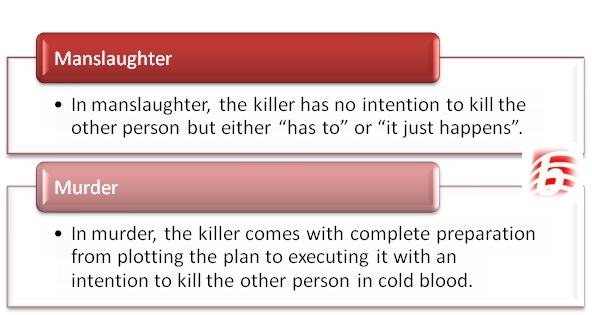Manslaughter vs Murder
The distinction between manslaughter and murder is based on the killer’s intent. In manslaughter, the killer does not intend to kill another person, but the death occurs. In contrast, murder involves the intentional killing of another person. Although both terms involve the act of killing, they have different meanings in forensics. The concept of killing is the same in both cases, but the intent behind the act separates murder from manslaughter. The complexity of distinguishing between these two types of killing has led to confusion for a long time, but popular forensic dramas on television have helped to clarify the differences.
Key Takeaways
- Manslaughter is an unintentional killing, while murder is an intentional killing.
- Manslaughter is divided into two categories: voluntary and involuntary, depending on the circumstances of the killing.
- The penalties for manslaughter are generally less severe than those for murder, due to the lack of intent to kill.
What is Manslaughter?
Manslaughter is divided into two categories: voluntary and involuntary manslaughter. In voluntary manslaughter, the killer does not plan to kill another person, but the killing takes place to protect the killer’s life or in the heat of the moment. For example, a victim may kill their attacker to escape from a rape attempt. Involuntary manslaughter occurs when a person unintentionally kills another person without prior planning. This may happen during a fight when one person kills another to protect themselves, but without the intention to kill. In both types of manslaughter, the killer does not plan the act or cover up the crime.
What is Murder?
A killing is considered murder when the killer intends to kill another person. This can involve premeditated, brutal acts, known as first-degree murder. In these cases, the killer plans the murder, prepares for possible obstacles, decides where to hide the body, and takes precautions to avoid leaving evidence at the crime scene.
What is the difference between Manslaughter and Murder?
- The main difference between manslaughter and murder is the killer’s intent: manslaughter is unintentional, while murder is intentional.
- Manslaughter involves either a situation in which the killer “has to” kill or when the killing “just happens,” while murder is a premeditated act with the intent to kill another person.
- The penalties for manslaughter are generally less severe than those for murder, due to the lack of intent to kill.
Although both forms of killing are unforgivable, manslaughter is considered a lesser crime than murder. In both cases, the perpetrators must be convicted based on evidence that proves their guilt beyond a reasonable doubt. These acts cannot be forgiven, and many argue that they must be punished accordingly.
